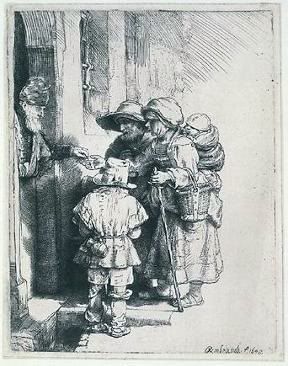Public Displays of Electio...I Mean Affection

The relationship between the two commands to love God and love neighbor resonates in perfect harmony with James' statement that, "This is pure and undefiled religion in the sight of our God and Father, to visit orphans and widows in their distress, and to keep oneself unstained by the world." (James 1:27). In writing these words, James is not excluding other people groups from being ministered to by Christians, rather, he uses the language of the Mosaic Law, the example of the widow and orphan (Ex 22:22; Deut 10:18, 14:29, 16:11-14, 24:17-21, 26:12-13, 27:19) to speak of our obligation as a chosen race, a royal priesthood, a holy nation, a people of God's own possesion (Ex 19:5-6; Deut 7:6, 10:15; 1 Pet 2:9-10) to visit even the most needy of mankind.
So what does visiting mankind in their distress look like? What shape does our love for our neighbor take? There's a lot of confusion, I believe, in how we minister to those around us, and where their distress lies, where we are to visit them. It seems that we have greviously overlooked the need for physical ministry in favor of what I see to be an unrealistic spiritual ministry. Now, obviously, the greatest need of the world is that of a Savior. However, we must never forget that we can not even know our own hearts (Jer 17:9), and therefore can not hope to know the heart of others. In fact, the Scriptures tell us straight out that it is God that looks on the heart and that man looks on the outward appearance (1 Sam 16:7). I'm not saying that we can't minister spiritually, but rather that our ministry to the spirit of our neighbors grows out of our ministry to their body: how we meet their physical, even material, need (emphasis on need). We can not look at a man and discern his spritual state, we just can't. However, it is upon our visitation to them (and sometimes their visiting us) that we are able to discern their physical need. The Law of Moses is saturated with the sanctity of human life and the obligation to make provisions for those in need as a means of extending the grace of God to them. The gleaning laws, for example, ordered God's people to leave the edges of their fields unharvested, to leave the gleanings that were dropped during harvesting on the ground, and to leave a portion of grapes in their vineyards for the poor and the sojourner (Lev 19:9-10, 23:22). Similarly, the 3rd year tithe (Deut 14:28-29) ordered community provision for the Levite (who had no inheritance), the alien, the widow, and the orphan. It is through the adminstration of care to the physical need of our neighbor that we come to meet the need of their spirit.
Now, this doesn't discount spiritual ministry. In fact, I think it expands, or even facilitates it. We can not minister to the spirit in the ways we have been trying to. We can not attend to another's need of salvation; we cannot provide forgiveness of sin. Neither can we mend the spirit that is already saved. Only God, in the Spirit, because He is spirit, can attend to the spirit. But here's the thing, not only can God work through us to do those things, but has, amazingly, chosen to do so. Even still, it is God that effects the ministry. "I planted the seed, Apollos watered it, but God made it grow" (1 Cor 3:6). Just as the preaching of the word is effective because it is God's word that is being spoken and not our own, the power of prayer is that of the hand of God which moves to accomplish His will which we pray for (does not the righteous man fervently pray [James 5:16] for God's will to be accomplished in spite of his own desires [Luke 11:1-4, 22:41-44; Romans 1:9-10]?). Yet, how much faith do we have in God to answer those prayers if we won't see that we ourselves may very well be His answer? God does accomplish His will which we pray for, and has chosen to do so through His people, through us. And we, by this design, can not participate in any of it, we can not play a roll in God's ministry to the spirit, the accomplishing of His will, nor receive any of the blessings that come out of it (Deut 14:29), without first contacting the physical.
Now, here's the question: how does this affect our understanding of the gospel? How does it inform our sharing and preaching of it? Can we ever preach the gospel without caring for our neighbor's physical need? As Christians, can we ever meet that need without sharing the gospel? Consider the words of Christ, the Judge, recorded in Matthew 25:34-46.
“Then the King will say to those on His right, ‘Come, you who are blessed of My Father, inherit the kingdom prepared for you from the foundation of the world. ‘For I was hungry, and you gave Me something to eat; I was thirsty, and you gave Me drink; I was a stranger, and you invited Me in; naked, and you clothed Me; I was sick, and you visited Me; I was in prison, and you came to Me.’ “Then the righteous will answer Him, saying, ‘Lord, when did we see You hungry, and feed You, or thirsty, and give You drink? ‘And when did we see You a stranger, and invite You in, or naked, and clothe You? ‘And when did we see You sick, or in prison, and come to You?’ “And the King will answer and say to them, ‘Truly I say to you, to the extent that you did it to one of these brothers of Mine, even the least of them, you did it to Me.’ “Then He will also say to those on His left, ‘Depart from Me, accursed ones, into the eternal fire which has been prepared for the devil and his angels; for I was hungry, and you gave Me nothing to eat; I was thirsty, and you gave Me nothing to drink; I was a stranger, and you did not invite Me in; naked, and you did not clothe Me; sick, and in prison, and you did not visit Me.’ “Then they themselves also will answer, saying, ‘Lord, when did we see You hungry, or thirsty, or a stranger, or naked, or sick, or in prison, and did not take care of You?’ “Then He will answer them, saying, ‘Truly I say to you, to the extent that you did not do it to one of the least of these, you did not do it to Me.’ “And these will go away into eternal punishment, but the righteous into eternal life.”Christ doesn't condemn by saying, "I was naked and you didn't lead me down the Roman's Road." He doesn't bless by saying, "I was hungry, and you walked me through the Way of the Master." The blessing and condemnation is on the grounds of either meeting or ignoring the physical need; Christ mentions nothing about preaching, or believing, the gospel (I know, I know... just stick with me). And look at the physical needs mentioned: hunger, thirst, nakedness, homelessness, sickness, imprisonment; not one of us doesn't know someone suffering from one of these. This is the condition of the world which we are to minister to, this is the condition in which we will find the man lying on the side of the road when we "go and do likewise" (Luke 10:25-37).
Now, what we have to remember is that the passage in Matthew 25 and the parable in Luke 10 are spoken by the same Savior who would later tell His apostles to go and preach the gospel to all creation and make disciples (Mark 16:15, Matt 28:19). So, how do we reconcile those commands from our Lord who will later judge us on whether or not we ministered to the physical? Is there some separation of body and spirit which defines a difference between our calling and our salvation? Or could it be that the the commands given in the great commission and the criteria by which we will be judged according to Matthew 25 are one and the same? Could it be that the gospel is not just words, but also action, and that when we are enabled to believe it we are also enabled to live it; could it be that our salvation is our calling (Phil 2:12-13)? Could it be if the extent of our ministry and sharing of the gospel is street witnessing, or leaving tracts on doorsteps or under windshield wipers, or even prayer vigils, that we are doing an injustice to the truth and fullness of the Savior's grace?
What use is it, my brethren, if a man says he has faith, but he has no works? Can that faith save him? If a brother or sister is without clothing and in need of daily food, and one of you says to them, “Go in peace, be warmed and be filled,” and yet you do not give them what is necessary for their body, what use is that? Even so faith, if it has no works, is dead, being by itself. James 2:14-17If the gospel is that which we believe in, and if the gospel we preach does not include ministering works, then it is a dead gospel of a dead faith. We cannot minister directly to the spirit. We cannot change a human heart to confess Christ and believe God. But that does not excuse us from ministering. If we speak the gospel and God does not cause it to bear fruit, have we truly ministered? Is that all we are required to do? Doesn't true ministry benefit the one who is ministered to rather than satisfy the conscience or fulfill a requirement of the minister? Those we minister to should be markedly better off when we leave them than when we first came to them, shouldn't they? Are we to say that we have no obligation to feed the starving unbeliever if he doesn't "get saved"? And if he is saved by God, do we tell him that everything's going to be OK from now on and then leave him in his hunger? Are we to think that we have no personal responsibility to the homeless who live under the bridge, the begger that comes to our door, the widows of war, the orphans of genocide, and the babies dying of AIDS beyond the presentation of an outline, a 2 minute prayer, and a gospel tract? Though we may have spoken words of hope to them, we have truly shown them nothing of the reality of that hope, never mind our own trust in it. This is not what we have been called to. We have been saved to be a blessing to the nations, even the pagan nations that surround us. We have been commanded to care for the widow, the orphan, the stranger in our gates in their need. We have been commanded to feed the hungry. We have been commanded to clothe the naked, to mend the sick, to give drink to the thirsty. We have been commanded to shelter the homeless. We have been commanded to visit the imprisoned. Indeed, we have been commanded to go and preach the gospel to all creation. And I think this is something far different than what we've been doing.

